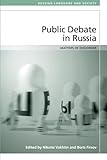Public Debate in Russia : Matters of (Dis)order / Nikolai Vakhtin, Boris Firsov.
Material type: TextSeries: Russian Language and Society : RLSPublisher: Edinburgh : Edinburgh University Press, [2022]Copyright date: ©2016Description: 1 online resource (416 p.) : 18 B/W illustrations 2 B/W tablesContent type:
TextSeries: Russian Language and Society : RLSPublisher: Edinburgh : Edinburgh University Press, [2022]Copyright date: ©2016Description: 1 online resource (416 p.) : 18 B/W illustrations 2 B/W tablesContent type: - 9781474411684
- 9781474411691
- Debates and debating -- Russia (Federation)
- Debates and debating -- Russia (Federation)
- Russian language -- Political aspects -- Russia (Federation)
- Russian language -- Political aspects -- Russia (Federation)
- Sociolinguistics -- Russia (Federation)
- Sociolinguistics -- Russia (Federation)
- Language & Linguistics
- LANGUAGE ARTS & DISCIPLINES / General
- 491.701/43 23
- PG2074.73 .P83 2016
- online - DeGruyter
| Item type | Current library | Call number | URL | Status | Notes | Barcode | |
|---|---|---|---|---|---|---|---|
 eBook
eBook
|
Biblioteca "Angelicum" Pont. Univ. S.Tommaso d'Aquino Nuvola online | online - DeGruyter (Browse shelf(Opens below)) | Online access | Not for loan (Accesso limitato) | Accesso per gli utenti autorizzati / Access for authorized users | (dgr)9781474411691 |
Frontmatter -- Contents -- Introduction -- Contributors -- 1. The Discourse of Argumentation in Totalitarian Language and Post-Soviet Communication Failures -- 2. Russian and Newspeak: Between Myth and Reality -- 3. ‘A Society that Speaks Concordantly’, or Mechanisms of Communication of Government and Society in Old and New Russia -- 4. Legal Literature ‘for the People’ and the Use of Language (Late Nineteenth and Early Twentieth Century) -- 5. ‘How to Write to the Newspaper’: Language and Power at the Birth of Soviet Public Language -- 6. Between the Street and the Kitchen: The Rhetoric of the Social(ist) Meeting in Literature and Cinema -- 7. Was Official Discourse Hegemonic? -- 8. Attempts to Overcome ‘Public Aphasia’: A Study of Public Discussions in Russia at the Beginning of the Twenty-first Century -- 9. Allotment Associations in Search of a New Meaning -- 10. ‘Distances of Vast Dimensions . . .’: Official versus Public Language (Material from Meetings of the Organising Committees of Mass Events, January–February 2012) -- 11. Insides Made Public: Talking Publicly about the Personal in Post-Soviet Media Culture (The Case of The Fashion Verdict) -- 12. Distorted Speech and Aphasia in Satirical Counterdiscourse: Oleg Kozyrev’s ‘Rulitiki’ Internet Videos -- 13. The Past and Future of Russian Public Language -- Notes on Contributors -- Subject Index -- Name Index
restricted access online access with authorization star
http://purl.org/coar/access_right/c_16ec
An interdisciplinary study of Russian public debate past and present Can we trace attempts taken in Russian history to overcome the inability to speak publicly? How do different social groups in modern Russia cope with situations when they have to participate in a public discussion and arrive at a compromise? What historic, sociological, linguistic, and psychological reasons underlie intolerance towards different opinions? Can this situation be changed?Bringing together an international team of leading historians, sociolinguists and sociologists in this field, this volume explores these questions from different methodological perspectives, using various sets of data and examining the different domains of private, public and official discourses. Offering detailed case studies of the past and present communicative successes and failures in various social groups, the book explores why Russian society is unable to reach a consensus through dialogue. The first book to offer a detailed exploration of the condition of public debate in Russia, this pioneering volume presents a truly interdisciplinary perspective on Russian language and society making it essential reading for advanced students and specialist in the fields of Slavic Studies, Cultural Studies, Sociolinguistics and Russian history, politics and sociology. Key FeaturesPresents a pioneering study of Russian public debateOffers a new approach to Russian modernisation through a multidisciplinary view on language and societyIncludes detailed case studies of the past and present communicative successes and failures in various social groups Brings together an established and international team of contributors from Russia, UK, Israel and FranceThe first book to offer a detailed exploration of the condition of public debate in Russia, this pioneering volume presents a truly interdisciplinary perspective on Russian language and society. Offering detailed case studies of the past and present communicative successes and failures in various social groups, the contributors explore why Russian society is unable to reach a consensus through dialogue.
Mode of access: Internet via World Wide Web.
In English.
Description based on online resource; title from PDF title page (publisher's Web site, viewed 30. Aug 2022)


